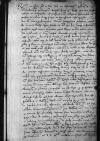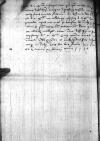⌊⌋ ⌊hinc⌋ 1537-02-02⌊II-a huius1537-02-02⌋, quae tum se offerebant, in compendio. Ad praesens etiam, colligens sarcinulas, non possum, ut velim utque scripsi in ⌊⌋, esse copiosior, summatim tamen omnia perstringam. 1537-02-04⌊Dominica Sexagesimae praeterita1537-02-04⌋ ⌊maiestas regia iunior⌋ omnibus ⌊Regni⌋ statibus et nobis, qui hic sumus, ius iurandum praestitit, quod maior nuntiorum pars ⌊Regni⌋ audire noluit, priori die insalutato – ut aiunt – hospite abeuntes, priusquam ius iurandum esset praestitum. De nostris privilegiis cum ⌊maiestate regia seniore⌋ sumus collocuti. Respondit ⌊maiestas eius⌋ se nobis daturam litteras, quibus polliceri vult pro ⌊filio⌋, quod omnia in privilegiis nostris contenta observare debeat. Hoc ipsum si post mortem ⌊patris⌋ non fecerit, nos etiam in nullo ei esse obligatos. Istiusmodi etiam litteras omnibus ⌊Regni⌋ statibus iam dedit. Nostras adhuc non habemus, utque intellegimus, non eiusmodi nobis tenoris dari debent, quod non parum nos turbat. Daturi tum sumus adhuc operam, ut tales iuxta promissum habere possimus[1]. Super libello famoso, quod contra nos hic obtulerunt nostrae nobilitatis nuntii[2], satis eis est a ⌊maiestate regia⌋ acriter responsum, verbisque duris et pro meritis correpti nihil eorum, quae petiverant, obtinuerunt, omnibusque infectis hinc non sine turbatione discedunt etc.
Causa ⌊viduae Vagslagerin⌋[3] determinata est iuxta nostram ⌊Elbingi⌋ latam sententiam[4]. Dissidium inter ⌊Thoronenses⌋ et ⌊Plocenses⌋ compositum ea est lege, quod quibuslibet annis ⌊Plocensibus⌋ licebit centum lastas duntaxat alecum adverso ⌊Vistula⌋ ad suos educere, aliis regnicolis, hoc est spiritualibus et nobilibus, decebit non amplius quam pro usu domus in scaphis suis ultra ⌊Thoroniam⌋ ascendendo habere etc.
Ad sopiendam controversiam gravaminum, quae nobilitas nostra cum magnis et parvis habet civitatibus, deputati sunt unanobiscum consiliarii ⌊Regni⌋ duo[5]: ⌊dominus palatinus Posnaniensis⌋ aut ⌊filius eius castellanus⌋, et ⌊palatinus Iuniwladislaviensis⌋, de quibus ⌊⌋ etc.
Sigilla dabuntur domino Premisliensi(!)[6] et ⌊nepoti⌋ ex ⌊sorore⌋ olim ⌊castellani Cracoviensis Shidlowieczki⌋. ⌊Reverendissimus dominus Plocensis⌋ se hinc ad ecclesiam suam confert etc.
Decreveram, ut ⌊⌋, hinc recta nuntium meum per ⌊Masoviam⌋ ad Dominationem Vestram Reverendissimam mittere et ipsemet eodem itinere ad Dominationem Vestram Reverendissimam subsequi, verum, cum tempora mutata sunt propter [gla]ciorum dissolutionem, veritus, ne liquefactus ⌊Vistula⌋ me impedi[ret], coactus sum mutare sententiam, ex ⌊Lubavia⌋ Deo bene fave[nte] ad Dominationem Vestram Reverendissimam me collaturus. ⌊Praepositus Dominationis Vestrae Reverendissimae⌋ hac ho[ra] prandet apud me. Conatur se excusare de omnibus, quod facil[e] admitto, cum
cf. Cic. S. Rosc. (20) 57 Alii vestros anseres sunt qui tantum modo clamant, nocere non possunt. ⌊nocere non potuerit etc.cf. Cic. S. Rosc. (20) 57 Alii vestros anseres sunt qui tantum modo clamant, nocere non possunt. ⌋
Nova, quae habeo, ex adiunctis intelliget, coram omnia diffusius, ut spero, b[revi] expositurus Dominationi Vestrae Reverendissimae, cuius paterno amori me commendo, Deumque precor, ut eandem quam diutissime sospitet pro[spe]retque in omnibus. 1537-02-12⌊Cras1537-02-12⌋ Deo bene favente hinc sum itu[rus].
[1 ] The state of research on the issue of Sigismund II Augustus confirming Royal Prussia’s privileges is discussed by Anna Sucheni-Grabowska in the article “Jagiellonowie wobec Prus Królewskich i Książęcych 1525-48” (cf. SUCHENI-GRABOWSKA 1978 p. 413-416 ⌊Sucheni-Grabowska, p.413-416cf. SUCHENI-GRABOWSKA 1978 p. 413-416 ⌋)
[2 ] The Royal Prussian gentry’s legation to the 1536/37 Diet included: Chełmno district judge ⌊Jerzy Plemięcki⌋ and aldermen ⌊Fabian Wolski⌋ and ⌊Maciej Mgowski⌋ (cf. e.g. cf. MAŁŁEK 1976 p. 131 ⌊Małłek, 1976, p. 131cf. MAŁŁEK 1976 p. 131 ⌋)
[3 ] Anna Woszczkowa (Waxschlagerinn) was in litigation with her late husband’s family (cf. e.g. cf. AT 17 No. 63, 164, 445 ⌊AT, vol. XVII, No. 63, 164, 445cf. AT 17 No. 63, 164, 445 ⌋, cf. AT 18 No. 252, 438 ⌊AT, vol. XVIII No. 252, 438cf. AT 18 No. 252, 438 ⌋)
[4 ] Dantiscus is doubtless writing about the sentence passed at the assembly in Elbląg in the autumn of 1536
[5 ] The demand that royal commissioners take part in the Prussian springtime assembly in 1537, to help resolve disputes, was contained both in the gravamina submitted at the 1536/37 Diet and in the opinion about them issued by the Prussian Council. The commissioners were ⌊Łukasz Górka⌋, ⌊Janusz Latalski⌋ and Łęczyca castellan ⌊Piotr Służewski⌋ (cf. cf. LENGNICH 1722 doc. No. 76, p. 193-198 ⌊Lengnich, doc. No. 76, p. 193-198cf. LENGNICH 1722 doc. No. 76, p. 193-198 ⌋) (see also ⌊⌋, ⌊⌋, ⌊⌋, ⌊⌋
[6 ] Contrary to Dantiscus’
expectations, Gamrat did not receive the seal; on February 16, 1537 the then Płock bishop, Jan Chojeński, was nominated for the post of Grand Chancellor
[] Acc. to printed lists of officials based on entries in the books of the Crown Register, Wolski was nominated for the post of Vice-Chancellor as early as January 3, 1537 (cf. cf. Urzędnicy 10 No. 635 ⌊UrzCentrPol No. 635cf. Urzędnicy 10 No. 635 ⌋)

